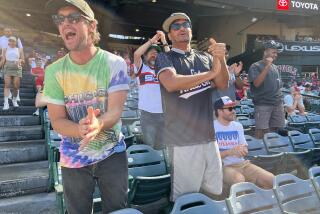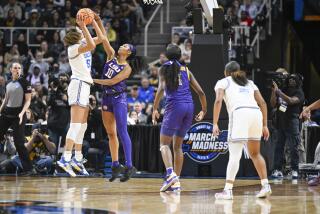A War Doesn’t Make Sense to Ex-Navy Man
- Share via
TEMPE, Ariz. — Paint me a picture of an American paradise. Put a baseball park under a rise of red-rock buttes. Color in the close-cropped outfield grass, a hardy mix of rye and Bermuda that fairly glistens in the noon sunshine. The freshly dragged dirt of the infield, of course, will be pool-table flat, the foul lines chalked a brilliant white.
Fill the grandstands with a couple thousand fans -- a mix of snowbirds and young families and autograph hounds enjoying the easy access of spring training. They have come this Thursday to see the Anaheim Angels play the Oakland A’s in a “split squad” Cactus League game.
As they watch the players take infield practice, Bruce Springsteen blasts from the sound system, singing about the “glory days” of youth. A soft breeze carries a whiff of “halo dogs” and popcorn from the concession stands. Atop the tallest butte behind left field, the American flag waves.
It’s nearly spring in the desert -- warm but not hot -- and about a hundred or so spectators spread beach blankets on the grass that slopes upward behind the left-field fence. They will tan and take in some baseball at the same time. What’s it called, this brigade of sunbathing regulars? An old-timer considers the question.
“I don’t know,” he says finally. “How about the ‘berm bums?’ ”
Exactly half a world away, in another desert, American troops have massed in anticipation of war. There is no mention of this fact in the brief pregame rituals -- just a recital of the starting lineups, a few warnings about foul balls and unruly fan behavior, a piped-in version of the national anthem, and then: “Play ball!”
The game starts fast, but in the bottom of the second inning falls into a trough of errors and bloops and walks and finally line drives, one after another. The Angels put up six runs, and it’s a happy, noisy crowd of partisans. The A’s come back with five of their own in the next half-inning, and by the middle of the third the game already is an hour old.
“This one might never end,” mutters an usher posted at Aisle 17, behind the first-base dugout.
He wears short pants, a red Angel polo shirt and baseball cap, and an easy smile. His nameplate identifies him as Bill, from Oregon. Like all the people who work Angel spring training games, Bill Buckholtz is a volunteer. An arthritic condition and related complications drove him out of the workforce as a young man. Now 55 years old, he has time on his hands.
At this point in the contest, there’s not much for an usher to do but watch the game, pass out an occasional tube of free sunblock and make small talk with fans. Typically this talk consists of gloating recitals of temperatures in the nation’s colder cities:
“Where you from? Wisconsin? It’s 38 degrees there today. I guess you’re having a heat wave. Ha. Ha.”
Buckholtz notices a press pass and a notebook, and asks a reporter why he has strayed from the press box. The war debate is mentioned, the idea of going about the country to ask citizens at ground level what they make of things.
“Well,” Buckholtz says, beginning his rhetorical windup, “as for me personally, I just don’t get it. I don’t get it at all. There are so many things that just don’t make sense to me right now.”
He questions, for example, the timing. Whatever threat Saddam Hussein poses to the United States has not changed “since the time of George Bush the father. So why invade now?”
He wonders, too, about motivation; every week, it seems, the White House offers yet another rationale for invasion.
It’s about Saddam’s nuke program. No, it’s about human rights violations: He gasses his own people.
It’s about anthrax, nerve gas; Saddam’s stockpiling weapons of mass destruction. No, he’s just not destroying them fast enough.
It’s about regime change.
It’s about maintaining the integrity of the United Nations.
It’s about planting a flower of democracy in the Middle East.
It’s about 9/11, about teaching terrorists a lesson the world over.
“What is the connection between Iraq and what happened Sept. 11?” Buckholtz demands. “I’m all for going after Bin Laden and Al Qaeda, and I don’t care if we torture them or not. Everybody knows what is going on with Al Qaeda and Afghanistan. They saw it on television. They saw the trade center come down. They saw the Pentagon attacked. But what does that have to do with Iraq? I don’t get it.”
A booming fly arcs to the right-field fence.
“Out of here!” someone cries out.
“Nope,” Buckholtz counters softly. “Not quite enough.”
The outfielder catches the ball on the warning track.
Buckholtz grew up in Medford, Ore., joined the Navy in the late 1960s and served at Lemoore Naval Air Station, in California, as a meteorologist. He’s the father of three. A middle-of-the-road Democrat, he happily supported Republican John McCain in the last presidential derby.
Though Buckholtz describes himself as “definitely not a hawk,” he’s not exactly a dove, either. The protesters he sees marching across his television screen on the news these days strike him as people trying too hard to relive -- or re-create -- the ‘60s, their slogans off-point, stale.
He has a son in high school who is keen on a military career: “I don’t want him in a war, no parent does. But if he does have to go, I’ll support him. I just want it to be justified -- not some war just because someone wants to get a little glory in the history books.”
In his trips to the hospital for treatment, Buckholtz meets a lot of “disgusted” Vietnam vets; it would not be wise, he suggests, to enter another war with muddled intentions, especially without the support of all our allies.
“What are we going to do,” he asks, “police the world?”
The game moves slowly. The regulars make way for unknown minor leaguers, prospects identified by the unusually high numbers on their backs. By the eighth inning, it’s a matter of the Angels’ No. 64 lining out to the A’s No. 65, to be followed by No. 90, who flies out to No. 31, someone named Swisher, who’s not even listed on the game roster.
“And I don’t like the idea of firing the first shot,” Buckholtz says. He mentions a book he read recently about Pearl Harbor. It made him wonder what a “preemptive” invasion might mean in terms of America’s place in the world.
The Japanese, he notes, attacked the U.S. without officially declaring war, “and they will be forever plagued with that embarrassment. And it will be the same with us. We are supposed to be the country of freedom and human rights, and to fire the first shot, well, it just doesn’t sit with me. I just don’t get it.”
He shakes his head and leaves it at that. He’ll remain at his post until the final out, which comes about four hours after the first pitch. The Angels win, 8-5. The few die-hards who stayed until the end are serenaded by Willie Nelson’s rendition of, “The Party’s Over” as they shuffle out of the ballpark. If they hurry, they can be back at their homes or hotel rooms in time to catch the president on television, live from the White House, making a case, once more, for war.
More to Read
Go beyond the scoreboard
Get the latest on L.A.'s teams in the daily Sports Report newsletter.
You may occasionally receive promotional content from the Los Angeles Times.







